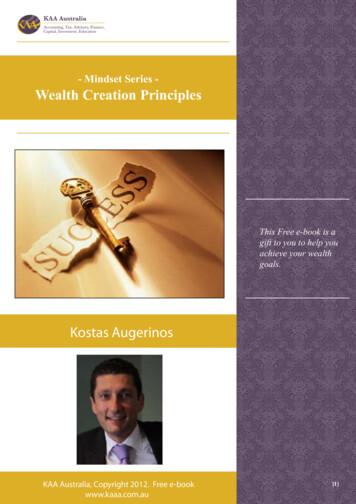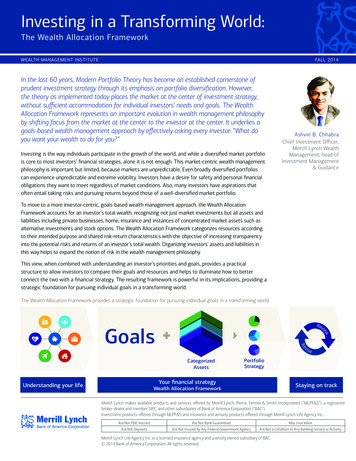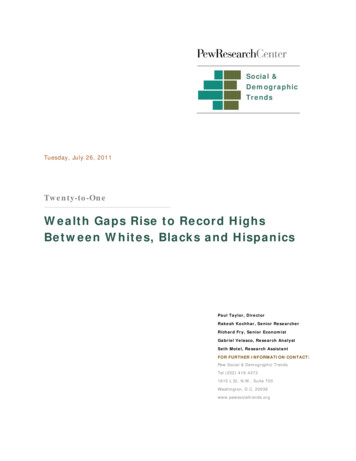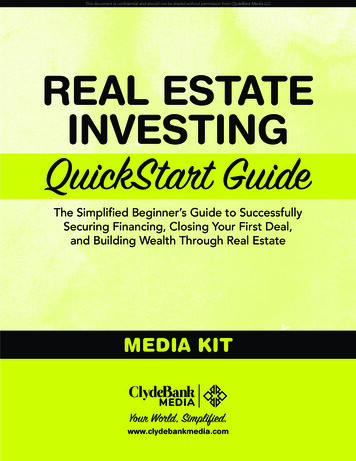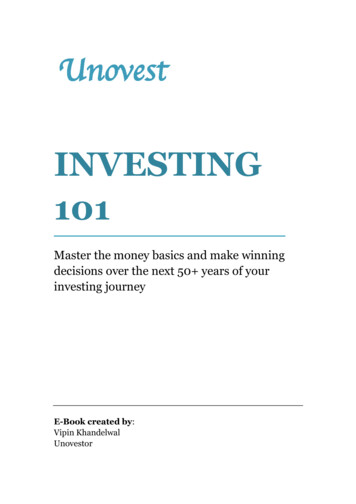
Transcription
INVESTING101Master the money basics and make winningdecisions over the next 50 years of yourinvesting journeyE-Book created by:Vipin KhandelwalUnovestor
INVESTING 101 – THE MOST IMPORTANT THINGS ABOUT YOUR MONEYIntroductionHiIt’s sad that thousands of crores of money of investors like you hasgone down the drain by investing in bad financial products.The chances that you will have to work longer to achieve yourretirement, your financial freedom goes up with every stupidmistake that you do with your money.And it is quite likely that the bank that you trust so much is takingyou for a complete ride.You see it’s a jungle out there, a financial jungle. There are howlingjackals, hissing cobras and cunning foxes ready to prey on you.And, if you are not prepared, the chances that you will make itthrough are pretty bleak.You have to arm yourself with the knowledge and the weapons tobe able to protect yourself from the hungry wolves that are there todevour your hard earned money.And you have to do it now.The good part is that this is a risk you can control. You can secureyour finances as also ride through this financial jungle to yourultimate freedom.That’s where Investing 101 comes in.This book has one single focus. To equip you the most importantthings about money and investing that you can use to makesensible and rewarding investment decisions.WWW.UNOVEST.CO2
INVESTING 101 – THE MOST IMPORTANT THINGS ABOUT YOUR MONEYOver the next 50 years and more of your investing life, these“important concepts” will stand guard for you and help you makethe most of your money.As you go through this EBook, you will Understand the most important basics of investingGet the tools to evaluate investing decisionsBuild a mental framework to think moneyGet a checklist of the most important things to do with yourmoneyKnow how to ask important questions about money andinvestingRealise the role of insurance in personal finance and how is itdifferent from investingStart to focus on the right sources of information for decisionmakingSave your taxes without the last minute rush and with a focuson your financial planSo, go ahead and get yourself a lifetime of mental peace.-While you can read this eBook, it will be great to revisit some ofthese lessons again. Hence, you should go to this link andsubscribe to receive the course on email as well. Each one of theselessons will arrive over a few weeks and help you build a solidunderstanding.If you have any feedback or comment that you would like to share,feel free to write to me at vipin@unovest.co.All the best!Vipin KhandelwalWWW.UNOVEST.CO3
INVESTING 101 – THE MOST IMPORTANT THINGS ABOUT YOUR MONEYDisclaimerAll information in this eBook is for education and informationpurpose. It is to help you become a better investor. None of theinformation in this document is to be considered as investmentadvice.WWW.UNOVEST.CO4
INVESTING 101 – THE MOST IMPORTANT THINGS ABOUT YOUR MONEYLesson Index1. 10 money basics you should never forget2. The ultimate formula to create wealth3. 7 laws of investment diversification4. How to save taxes smartly?5. The real purpose of insurance 2 ways to calculate yourinsurance cover requirement6. Equity Investing - Let's get this straight7. The 3 essential elements of investments8. Meet your 3 new friends – PV, FV, XIRR9. The 3 investment mistakes you should avoid10. Who should be your investment adviser?Bonus #1 Beware of Financial PornBonus #2 The Ultimate Money and Investing ChecklistWWW.UNOVEST.CO5
INVESTING 101 – THE MOST IMPORTANT THINGS ABOUT YOUR MONEYComing Soon!UNOVEST MONEY MASTERSoon, I am launching a new premium course, Unovest MoneyMaster.Once you complete Investing 101, you will have a solid grasp of themost important things and concepts about money and investing.Unovest Money Master will take it all to a new level. In this course,you will practise step by step all that it takes to build a winninginvestment portfolio.Having worked with hundreds of individuals over the past severalyears and helping them make the best possible decisions with theirmoney, I am now going to teach the same strategies to you.The Money Master course is going to empower you to: Take the guesswork out of your money decisions Stop making stupid mistakes and losing money Secure your financial future Achieve your financial freedomIf you will like to receive more information about this course andits launch as also get an early bird discount, click here.Regards,VipinWWW.UNOVEST.CO6
INVESTING 101 – THE MOST IMPORTANT THINGS ABOUT YOUR MONEYLesson #110 Money Basics youshould never forgetWWW.UNOVEST.CO7
INVESTING 101 – THE MOST IMPORTANT THINGS ABOUT YOUR MONEYMoney basics are not just about numbers or calculations but aboutbehaviour too.There are several of them. Here is a quick overview of 10 suchbasics. Useful to refresh even if you know them.#1 Never let your money be idleWhat if I say that I would pay you a rupee after 1 year instead oftoday? I bet you will not be okay with it.Why? Because there is a potential return on money that you canearn, such as interest. You can take the rupee today and earn thatinterest for 1 year. Hence a rupee today is clearly preferable.Based on the concept of ‘time value of money‘, a rupee is morevaluable today than it would be 1 year from now.Not letting your money work and leaving it idle is bad for yourfinancial future. Put it to work. By the way, money lying in yoursavings account is as good as idle.#2 Inflation is a hidden taxA related concept to Time Value is Inflation. Inflation is the rate atwhich prices increase. So, if you bought vegetables at Rs. 100 perkg 1 year ago and the same set of vegetables now cost Rs. 110 perkg, then the price has gone up by Rs. 10 per kg or 10%.You see inflation is sort of a hidden tax that eats into your moneyand reducing its value. Let’s take the same example as above. Ifyour income increases by Rs. 15 to Rs. 115 and the price by Rs. 10to Rs. 110, then after paying for the extra prices, you are left withjust Rs. 5 (Rs. 15 – Rs. 10). That is the real increase in your wealth,net of inflation.#3 Use the Power of CompoundingWWW.UNOVEST.CO8
INVESTING 101 – THE MOST IMPORTANT THINGS ABOUT YOUR MONEYSir Isaac Newton, the eminent scientist, called compounding the‘eighth wonder of the world’.Due to the compounding effect, your money works at a faster rateto grow itself. This is how it works.Suppose you invested Rs. 100 today at 10% interest for 1 year. Atthe end of 1 year, you will get Rs. 10 as interest. Now, let’s saythat you reinvest Rs. 110, that is the original Rs. 100 Rs. 10 of theinterest you received, at the same interest rate of 10% for another 1year.So, at the end of year 2, you will receive Rs. 11 (10% of Rs. 110) asinterest. So, your total value is now Rs. 110 Rs 11, that is, Rs. 121.Keep doing this for 10 years and your original Rs. 100 wouldbecome Rs. 259.37.If you invest Rs. 10,000 today, at the end of 10 years at 10%interest rate, its value would be Rs. 25,937. The same Rs. 10,000invested at a return of 15% for 30 years would turn into Rs. 6.6lacs.Sounds like a wonder, right?Compounding is the only way you can beat inflation (price rise) tocreate real wealth for yourself.#4 Differentiate Risk from VolatilityRisk is a venture into the unknown. When youdon’t know what you are doing, you take risk.Say, for example, investing in stocks. Stock canpotentially offer higher returns but you don’tknow what the price on a day-to-day basis willbe. This is also referred to as Volatility.WWW.UNOVEST.CO9
INVESTING 101 – THE MOST IMPORTANT THINGS ABOUT YOUR MONEYSo, the daily values can fluctuate but over a sufficient period oftime, the investment value goes up.In comparison a Bank Fixed Deposit gives you certainty of returnsas well as the principal.Risk presents itself in various forms. Not just with money butgenerally. What is the risk that you will suffer from a heart disease?When you take risks with understanding, they can bring youdisproportionate rewards.I read, “not taking risk is the biggest risk“. You can walk in withyour eyes open.#5 There is an Opportunity Cost to everythingSimply put, it is a trade-off. Choosing one over the other. Whenyou do something, you forego another. The benefit that you missout because of not doing the other thing is the opportunity cost.When you opt to go for further studies and give up a jobopportunity, you are foregoing all the income that you could haveearned while working.It reflects in almost all our choices: Watching a Movie vs. Readinga Book; Fixed Deposit vs. Stocks; A Job vs. Own Venture; Spend vs.Invest; Reading this blog vs. Not doing anything.#6 Profit is Vanity, Cash is SanityAre you one of those who like to see their investment portfoliosalmost on a daily basis? I hate it to break it to you but all you aredoing is nothing but an exercise in vanity. It does not add anyvalue. It actually wastes your time.Your paper profits have no value unless you realised themin cash by selling the investment or receive dividends or interest.WWW.UNOVEST.CO10
INVESTING 101 – THE MOST IMPORTANT THINGS ABOUT YOUR MONEYBased on your goals, you should rebalance your investments fromrisky to safe and that is what will count as your real wealth.Nothing happens to your investments because you look at themeveryday. In fact, given the way portfolio values can fluctuate,there is a chance you will end up in a hospital due to an emotionalbreakdown.#7 Plan“If you fail to plan, you are planning to fail.”It is very important to plan. A plan lays out the direction and thegoals based on which we can take specific actions and then reviewthe results to understand the impact of those actions. The reviewthen enables us to take appropriate steps to achieve our goals.Make a plan for your money (and your career too). If you don’thave one today, start with a simple note. Write down your goals, bywhen do you expect to achieve them and what is the plan ofaction to get there. Seek help if you need to.The exercise of making a plan will crystallise your thinking andbring enormous focus to your actions.#8 Commit to your GoalsYour financial or investment plan reflects the goals that you wishto achieve and the method that you will use. Goalsinclude a vacation abroad, a car, a house, kids education, socialservice and retirement.However, once the plan is made, it tends to remain just there,on paper. You swiftly go back to old habits.You follow the movements of the market, look at the highest returngenerating ‘snake oil’ investment and buy that big car which willWWW.UNOVEST.CO11
INVESTING 101 – THE MOST IMPORTANT THINGS ABOUT YOUR MONEYdivert resources from your retirement funds. Essentially, you arelosing focus. The likely result: a haywire financial life.Goals First. You got to commit to your goals. You have to ownthem. Without commitment, you will never be able to take thesteps or make difficult choices that will help you achieve them.This very commitment will prevent you from making mistakes,sometimes very costly ones, too.#9 Irrationality is for realWhen it comes to money,we often suspend ourrational thought and letemotions dictate ourbehaviour. Unfortunately,this is a universalphenomenon. Two keyemotions governthis irrationalbehaviour: Greed and Fear.Warren Buffet’s simple rule is noteworthy, “Be greedy when othersare fearful, and fearful when others are greedy.”Controlling your emotions and your irrationality is not an easy job.If you have ever tried to quit smoking, alcohol or drinking tea you know what I am saying.You will make several mistakes before you start seeing throughthis emotional game. I just hope you see through it faster.#10 Market Timing does not workOne of the oft-asked questions is “Is this the right time to invest?”WWW.UNOVEST.CO12
INVESTING 101 – THE MOST IMPORTANT THINGS ABOUT YOUR MONEYNow, what makes you believe it is not? Most pundits fail atpredicting the ‘right time to invest‘. You too can be assured of theoutcome of such an exercise.My 2 cents on this: “The right time to invest is NOW.”Yes, there are many other factors that you will take into account asa part of your plan. But never let the market or some prediction bya pundit decide when you should invest.It is good to remember that as an investor, the real difference toyour wealth comes from “the time in the market and not timing themarket.” Stay the course and ride the rough times and you will beglad about the outcome.WWW.UNOVEST.CO13
INVESTING 101 – THE MOST IMPORTANT THINGS ABOUT YOUR MONEYLesson #2The Ultimate Formulato Create WealthWWW.UNOVEST.CO14
INVESTING 101 – THE MOST IMPORTANT THINGS ABOUT YOUR MONEYWhen in school you must have come across various mathematicalformula – Algebra, Arithmetic, Geometry, Trigonometry, Calculus,etc.These formula are profound in their own way and they help us withtheir application in various aspects of work and life.However, do you know this formula related to money andfinance? It is a formula the application of which has the potentialto change our lives.As the hearsay goes, even a man of the stature of Einstein called itthe 8th wonder of the world.This formula is that of the Compound Interest. The fact thatmoney earns money on itself and thus has the potential to grow atan enormous rate is what compounding is all about.This is what the formula looks like:A P * (1 r) nHere,A means the Amount;P is the original money that you invest;r is the rate of interest which you will receive, andn, is the number of years for which the money is invested.The two factors that need to be paid special attention to are ‘r’ and‘n’ of which ‘n’, that is time, has the greatest impact.Try working it out in a financial calculator or MS Excel.WWW.UNOVEST.CO15
INVESTING 101 – THE MOST IMPORTANT THINGS ABOUT YOUR MONEYThe magic of compound interestCompound interest appears to be very common formula. Itprobably does not receive the attention it deserves. But mind you,its impact is no less.Talking about money and investments, compound interest growsyour money at an exponential rate.Usually when you make an investment, say Rs. 100 at 10% rate ofinterest, you receive Rs.10 every year.But with compound interest, you not only receive this interest ofRs.10 on your investment, but you also receive interest on theinterest earned. So, the Rs. 10 of interest earns you another 10%that is Re 1, the next year, taking the total to Rs. 11.This over a long period of time sets in a virtuous cycle of wealthcreation.Examples:1. Rs. 2,000 invested every month for 25 years at 10% average rateof return will turn into close to Rs. 27 lakhs.2. At the same rate of return, Rs. 10,000 invested every month turninto over Rs. 1 crore in just about 23 years.You see the little trick here. All you have to do is to ensure that youinvest your money regularly in a decent option and allow it to bethere for a long, long period of time.You don’t need fancy or complex investments to become wealthyand rich. Just get compounding to work for you.This is what Einstein said:WWW.UNOVEST.CO16
INVESTING 101 – THE MOST IMPORTANT THINGS ABOUT YOUR MONEY“Compound interest is the eighth wonder of the world. He whounderstands it, earns it he who doesn’t pays it.”What do you think?WWW.UNOVEST.CO17
INVESTING 101 – THE MOST IMPORTANT THINGS ABOUT YOUR MONEYLesson #3The 7 laws ofInvestmentDiversificationWWW.UNOVEST.CO18
INVESTING 101 – THE MOST IMPORTANT THINGS ABOUT YOUR MONEY“Don’t put all your eggs in one basket”This is one of the most well known and simplest ways to explaindiversification. The idea behind it is simple.If the basket falls, not all your eggs will be destroyed in one gosince they are spread out in different baskets.Diversification is a very important strategy in investmentmanagement and portfolio creation. More so, because we aredealing with money, our hard earned money, which we want touse to achieve our financial goals.In this lesson, let’s understand diversification from a differentperspective.It is a great method but some people really take it too far.The story of my friend Yash and his investmentsA few days ago, I was talking to my friend Yash and we happenedto touch upon the topic of his investments. Yash is aninteresting name. In Sanskrit, Yash means fame, repute (alsoreputation).You look at his portfolio and you will find in it every investmentthat you can think of.There are Mutual Funds (debt, equity, hybrid, over 50 schemes),Direct Stocks (30 of them), Unit Linked Insurance Plans (whodoesn’t have them), Endowment and Money Back policies (another5 in all), Post Office Deposits, Bank Fixed Deposits, NationalSavings Schemes, Public Provident Fund, Corporate Deposits,Infrastructure Bonds, Land and Gold (physical as well as throughETFs).WWW.UNOVEST.CO19
INVESTING 101 – THE MOST IMPORTANT THINGS ABOUT YOUR MONEYAnd he mentions proudly that he is planning to invest in anInternational fund too.I looked at him aghast and asked “So, why are you doing this?What is behind this huge array of investments you have?”Yash took his eyes off from the exciting football match on TV andreplied, “You see my friend, I don’t know what investmentis going to perform in the near future. Hence, I have put in moneyin all these. Some will perform, some will not but overall I willmanage a decent return and be safe. And you only told me a fewyears ago, not put all eggs in one basket.” He grinned.I shook my head while managing a feeble smile.I asked him further, “What is total value of these investments?”Yash started thinking and said, “I am not sure of the current valuebut as an approximation I think it should be around Rs. 25 lakhs.”Now, it was time for me to fall off my chair. I managed to say, “Youare spreading your money too thin, my friend”.Yash had got the concept of diversification right but he hadstretched himself too far in its implementation.I took it upon myself to inform Yash to get his diversification right.I had a detailed conversation with him and that is where the 7laws of investment diversification emerged.For your benefit too, here are they.WWW.UNOVEST.CO20
INVESTING 101 – THE MOST IMPORTANT THINGS ABOUT YOUR MONEYThe 7 Laws of Investment Diversification#1 Know where are you goingWhat do you want to achieve with your money? Do you want anearly retirement, fund your children’s education, buy a house or acar, save for charity or just travel around the world. You have to beas clear as possible about these goals. Then establish a valuefor each goal, the time period in which the money is required andhow important it is (priority).‘To know where you are going’ could be the single biggestdeterminant of financial success. It directs our actions firmlytowards the goal and enables us to make appropriate decisionseven in unclear situations or conflicting information.When I asked Yash, if he had done a goal setting exercise forhimself, his face drew a blank. Clearly, GOAL is a word heassociated only with football, his favourite sport, which hecontinued to watch on TV.#2 Understand the stakes – how much risk can you take“Yash, you got to pay attention here”, I almost scolded him. Hesheepishly turned the volume down and turned towards me. Icontinued and asked him, “How much risk can you take?”He thought for a while and said, “I am basically a risk taker. Ithink I can take a lot of risk.” I explained.Risk is the uncertainty that is attached to outcomes. When you arenot so sure about the outcome of a certain action, you call it risky?WWW.UNOVEST.CO21
INVESTING 101 – THE MOST IMPORTANT THINGS ABOUT YOUR MONEYIn the domain of investments, risk means the ability to see erosionof your investment value, specially those that have been invested inmarket linked securities like stocks (or mutual funds). However,the risk is more so present in short term, say in 5 years. If you arewilling to be invested in market linked securities for over 5 years,the chances of losing money are far less.Sometimes, you may have an attitude to take on risk, but yourcapacity may not allow you. You may have more immediate needsof funds or you have a loan to retire and hence the capacity is low.The vice versa is equally true.You may be financially well off but you may not want to risk yourmoney at any cost. Either ways, you have to assess where do youstand in terms of your risk taking capacity.Yash nodded and said, “I feel I would be a moderate risk taker.”#3 Spread it wide into asset classesAn asset class is a category of investment. While there can beseveral options within an asset class they tend to have similar riskand return characteristics. For example, you can invest in equityeither directly or through mutual funds.The most commonly referred to asset classes are Equity, Debt, RealEstate and Gold. Other asset classes would be commodities like oiland alternative investments like international funds.Now, as per your goals, time horizon and the risk taking capacity,distribute your savings in these asset classes. Why so?“Yash, as you mentioned earlier that you cannot have aperfect idea of what asset class or investment will perform.” Toreduce this risk, the best you can do is to invest in different assetclasses. If one is not doing well, the other’s performance couldcompensate for it.WWW.UNOVEST.CO22
INVESTING 101 – THE MOST IMPORTANT THINGS ABOUT YOUR MONEYTypically, when equity markets are down, Gold tends to go up. Inperiods of high inflation, equity markets may not do well, but debtwould outperform.Investing across asset classes cancels out the risk of one another tosome extent, and thus reduces the overall risk. This is also calledthe diversification benefit.“I agree,” Yash said as he raised his both hands up in the air.#4 Dig deeper – choose asset class sub-categoriesInside every asset class, there are further categories that you canchoose from. Take for example, Gold. You can buy physical gold oryou can invest in Gold Schemes of Banks or you can also buy aGold Fund that invests in gold mining companies and then ofcourse you can buy an Exchange traded fund or a Gold ETF.Real estate typically has residential property, commercial propertyand land.In equity, you can look at various sectors and the specific stockswithin those sectors. A sector call could be to invest in defensivesectors (those that do well even in an economic downturn) likeconsumer goods, banking, etc. and then going one step further, youwould want to commit your money to the largest public sectorbank or the consumer goods company that has started showing ahigh growth in its sales.Similarly, in debt, you could choose between corporate bonds,government bonds, Gilts, short term treasury bills, etc. Each comeswith its own unique characteristics.Yash concluded intelligently, “So, what you are saying is thatI can use the sub categories to further diversify risks and create abetter risk-adjusted return.”WWW.UNOVEST.CO23
INVESTING 101 – THE MOST IMPORTANT THINGS ABOUT YOUR MONEY“Perfect.”#5 Pump some real weightYash got excited and told that he had invested in this multi-baggerstock that got him 300% return. I was like wow. I couldn’t holdback my enthusiasm and remarked, “You must have become amillionaire by now”.Yash’s face dropped as he replied, “No. I had invested only Rs.10,000 in the stock, so it became Rs. 30,000.”“Oops!”, I said. And that led me to this conclusion.If you want your investments to make a significant contribution toyour portfolio, then you have to get them to have some real placefirst. Something that is 1% of the portfolio can only make a 2%impact, even if it grows by 200%. If the same investment is 10% ofthe portfolio, it can grow the portfolio by 20%. This will be true ofthe asset class such as equity, the sub category, such as the sectorand the stock within that sector.Don’t over-diversify like my friend Yash did. For example, if youare taking exposure to equity through mutual funds, about 3 to 5mutual funds should provide you all the diversification benefit thatyou are looking for.My recommendation is to get exposure to no more than 7 to10 investment instruments, overall across asset classes. This willensure that they have adequate weight to make any serious impacton the investment portfolio performance. Don’t spreadyour money too thin.#6 Put strategy over tactics“Yash, if you look again at your portfolio composition, it appearsthat you bought stocks or mutual funds that were expected to doWWW.UNOVEST.CO24
INVESTING 101 – THE MOST IMPORTANT THINGS ABOUT YOUR MONEYwell and invested small amounts of money in several insurancepolicies and various post office or bank deposits.”“Yes, that’s right”, Yash agreed.This is more of a tactical approach to diversification, that is, tryingto benefit in the short term through specific information withan expectation of quick gains. Tactical is good but it should alwayscome after the strategic. If you rely on a fully tactical investmentstyle, you put yourself at great risk of not meeting your financialgoals adequately.The strategic approach to diversification is what we have discussedso far – defining the goals, deciding the asset classes and allocationbetween them based on time horizon and risk taking capacity.You could also divide your portfolio into the strategic and thetactical, say in a ratio of 80:20. The strategic takes care of yourlong term goals, while the tactical is used to benefit from marketmovements or to invest in very high risk instruments / sectors.As an example, you can invest in diversified equity funds or inlarge sized companies as a strategic approach towards the longterm goals. While for short term tactical gains, you could invest inGilts or mutual funds that invest in Gilts. We witnessed a fallinginterest rate scenario and they could stand to benefit hugely invalue. (Remember: There is an inverse relationship betweeninterest rates and value of debt instruments.)“Are you suggesting me that I add one more investment?”, Yashsounded confused.I had to clarify quickly, “No, in fact what I am saying is that youfirst put your plan and your strategy in place.”I heard a deep “Hmmm” from him.WWW.UNOVEST.CO25
INVESTING 101 – THE MOST IMPORTANT THINGS ABOUT YOUR MONEY#7 Strike the re-balancing actWhen I asked Yash, if he had been rebalancing his investments, patcame his reply, “I have only seen Ronaldo balancing the ball onhis head. The rebalancing you are talking about has gone over myhead.”I should have expected that. I switched off the TV making Yashvisibly unhappy. I ventured into an explanation.Whatever diversification you create initially, it has to be monitoredover time and adjustments made to reflect your current priorities,goals, time horizon and risk taking capacity. Like a rope walker orsomeone like Ronaldo, you have to keep striking the balanceregularly so as to derive the best risk-adjusted returns from yourdiversified investments.The typical reasons you need to re-look and re-balance yourinvestments are: You could be reaching certain goals in the near term. Youneed to move your assets from risky ones to more certainones. A need for funding your daughter’s college education in1 year would mean that you should withdraw the money andpark it in a safe fixed deposit with a bank.The market movements could change the value of your marketlinked investments such as equity, gold, real estate, etc. Thiswould result in a shift from the original allocation. Forexample, equity markets have risen 100% in the last one yearand hence they now stand at 34% of your portfolio instead ofthe 30% that you had allocated to them. You would need toadjust your numbers so that they go back to about 30% of theoverall portfolio.Yash listened very carefully. He did not react for some time andsuddenly we stood up, walked into his room. I was afraid whetherthis was the reaction to my switching off the TV.WWW.UNOVEST.CO26
INVESTING 101 – THE MOST IMPORTANT THINGS ABOUT YOUR MONEYAfter about 10 minutes, he emerged carrying about a dozen fileswith sheets of papers falling through them. He put them on thetable and said, “I want to set my portfolio right. Let’s put the 7laws of investment diversification into practice starting rightnow”.We both looked at each other and smiled.Quick recap of the 7 laws of investment diversification1.2.3.4.5.6.7.Know where you are going – define your goalsUnderstand how much risk can you takeSpread your investments into asset classesChoose sub-asset classesProvide adequate weightage to your investmentsDon’t rely on random tactics – have a strategy in placeRebalance periodicallyDoes your financial life sound like Yash? If not, ensure you don’tget into his situation.WWW.UNOVEST.CO27
INVESTING 101 – THE MOST IMPORTANT THINGS ABOUT YOUR MONEYLesson #4How to save taxessmartly?WWW.UNOVEST.CO28
INVESTING 101 – THE MOST IMPORTANT THINGS ABOUT YOUR MONEYDo you know how much tax do you pay on your annualincome?If you have an income of over Rs. 10 lakhs per annum, you easilyfall into the 30% tax bracket. What it means is that a portion ofyour income will be taxed at the highest rate of 30%. That’s a bigcut of your hard-earned money!When you are a salaried person, I totally understand ‘what a paintaxes are‘. I have been there too. We feel the pain when the salarythat we receive and the one we signed on in the appointment letteris never the same. The annual bonus too somehow magically is just70% of the declared number. And as you rise up the career ladder,your income ladder always seems to lag behind.All this is courtesy one Income Tax Department that makes somedemands on your hard earned money with that one dreaded word,TAX. Even before the monthly paycheque hits the bank account,the tax guys have already deducted the tax in advance. And whatwe have is just the leftovers.Early on in the year, the HR department chases you to declare yourinvestments for tax savings. When you don’t, it follows up with athreat note that says, “Taxes will be deducted”. And t
INVESTING 101 - THE MOST IMPORTANT THINGS ABOUT YOUR MONEY WWW.UNOVEST.CO 3 Over the next 50 years and more of your investing life, these "important concepts" will stand guard for you and help you make the most of your money. As you go through this EBook, you will Understand the most important basics of investing



